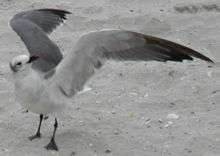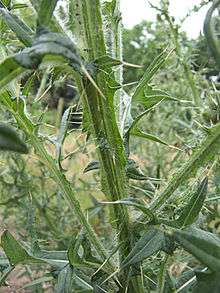wing
See also: Wing
English

A laughing gull with its wings extended in the gull wing profile

A mute swan spreads its wings.

The wing of a landing BMI Airbus A319-100. The slats at its leading edge and the flaps at its trailing edge are extended.

The winged stem of Cirsium vulgare.
Etymology
From Middle English winge, wenge, from Old Norse vængr (“wing”), from Proto-Germanic *wēinga, *wēingan-. Cognate with Danish vinge (“wing”), Swedish vinge (“wing”), Icelandic vængur (“wing”), from *h₂weh₁- (“to blow”), thus related to wind. Replaced native Middle English fither (from Old English fiþere, from Proto-Germanic *fiþriją), which merged with fether (from Old English feþer, from Proto-Germanic *feþrō). More at feather.
Pronunciation
- enPR: wĭng, IPA(key): /wɪŋ/
Audio (US) (file) - Rhymes: -ɪŋ
Noun
wing (plural wings)
- An appendage of an animal's (bird, bat, insect) body that enables it to fly; a similar fin at the side of a ray or similar fish
- (slang) Human arm.
- (aviation) Part of an aircraft that produces the lift for rising into the air.
- One of the large pectoral fins of a flying fish.
- One of the broad, thin, anterior lobes of the foot of a pteropod, used as an organ in swimming.
- (botany) Any membranaceous expansion, such as that along the sides of certain stems, or of a fruit of the kind called samara.
- (botany) Either of the two side petals of a papilionaceous flower.
- A side shoot of a tree or plant; a branch growing up by the side of another.
- Passage by flying; flight.
- to take wing
- Shakespeare
- Light thickens; and the crow / Makes wing to the rooky wood.
- Motive or instrument of flight; means of flight or of rapid motion.
- Shakespeare
- Fiery expedition be my wing.
- Shakespeare
- A part of something that is lesser in size than the main body, such as an extension from the main building.
- the west wing of the hospital
- the wings of a corkscrew
- Anything that agitates the air as a wing does, or is put in winglike motion by the action of the air, such as a fan or vane for winnowing grain, the vane or sail of a windmill, etc.
- An ornament worn on the shoulder; a small epaulet or shoulder knot.
- A cosmetic effect where eyeliner curves outward and ends at a point.
- A fraction of a political movement. Usually implies a position apart from the mainstream center position.
- An organizational grouping in a military aviation service:
- (Britain) A panel of a car which encloses the wheel area, especially the front wheels.
- (nautical) A platform on either side of the bridge of a vessel, normally found in pairs.
- (nautical) That part of the hold or orlop of a vessel which is nearest the sides. In a fleet, one of the extremities when the ships are drawn up in line, or when forming the two sides of a triangle.
- (Can we find and add a quotation of Totten to this entry?)
- (sports) A position in several field games on either side of the field.
- (sports) A player occupying such a position, also called a winger
- (typography, informal, rare) A háček.
- 1985, David Grambs, Literary Companion Dictionary, page 378:
- ˇ wing, wedge, hǎcek, inverted circumflex (Karel Čapek)
- 1985, David Grambs, Literary Companion Dictionary, page 378:
- (theater) One of the unseen areas on the side of the stage in a theatre.
- (in the plural) The insignia of a qualified pilot or aircrew member.
- 2004: Chris Wallace, Character: Profiles in Presidential Courage
- Anyone and everyone with wings - press officers, operations specialists, even General Curtis LeMay, commander of the U.S. Air Force in Europe - was put on flight duty and took turns flying double shifts for "Operation Vittles."
- 2004: Chris Wallace, Character: Profiles in Presidential Courage
- A portable shelter consisting of a fabric roof on a frame, like a tent without sides.
- On the Enneagram, one of the two adjacent types to an enneatype that forms an individual's subtype of his or her enneatype
- Tom's a 4 on the Enneagram, with a 3 wing.
Hyponyms
Derived terms
Related terms
Translations
part of an animal
|
|
part of an aircraft
|
|
extension to a main body
|
fraction of a political movement
air force unit
panel of a car which encloses the wheel area
|
sports: position in many team sports
sports: person in such position
|
- The translations below need to be checked and inserted above into the appropriate translation tables, removing any numbers. Numbers do not necessarily match those in definitions. See instructions at Wiktionary:Entry layout#Translations.
Translations to be checked
|
|
Verb
wing (third-person singular simple present wings, present participle winging, simple past and past participle winged)
- (transitive) To injure slightly (as with a gunshot), especially in the wing or arm.
- (intransitive) To fly.
- 1907, Robert William Chambers, chapter V, in The Younger Set, New York, N.Y.: D. Appleton & Company, OCLC 24962326:
- Breezes blowing from beds of iris quickened her breath with their perfume; she saw the tufted lilacs sway in the wind, and the streamers of mauve-tinted wistaria swinging, all a-glisten with golden bees; she saw a crimson cardinal winging through the foliage, and amorous tanagers flashing like scarlet flames athwart the pines.
-
- (transitive, of a building) To add a wing (extra part) to.
- (transitive) To act or speak extemporaneously; to improvise; to wing it.
- (transitive) To throw.
Translations
to injure slightly
to fly — see fly
to be extemporaneous
|
|
to throw — see throw
Middle English
This article is issued from
Wiktionary.
The text is licensed under Creative
Commons - Attribution - Sharealike.
Additional terms may apply for the media files.